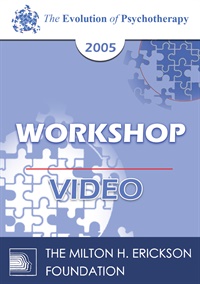- Average Rating:
- Not yet rated
- Topic Areas:
- Keynotes | Cognitive Behavior Therapy (CBT) | Psychotherapy | Pain and Healing | Panic
- Categories:
- Evolution of Psychotherapy | Evolution of Psychotherapy 2005
- Faculty:
- Aaron Beck, MD
- Course Levels:
- Master Degree or Higher in Health-Related Field
- Duration:
- 1:04:42
- Format:
- Audio and Video
- Original Program Date:
- Dec 11, 2005
- Short Description:
- Dr. Beck will provide a perspective on the evolution and the place of cognitive therapy today. He will compare standard cognitive therapy to newer developments in theory and therapy such as mindfulness, attention focus, and positive psychology. Dr. Beck also will discuss the role of cognitive approaches to conflict and suffering.
- Price:
-
Sale is $29.00
price reduced from Base Price - $59.00
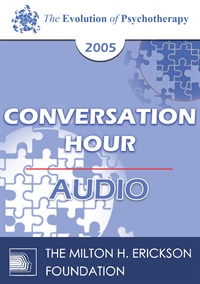
- Average Rating:
- Not yet rated
- Topic Areas:
- Conversation Hours | Psychotherapy
- Categories:
- Evolution of Psychotherapy | Evolution of Psychotherapy 2005
- Faculty:
- Albert Bandura
- Duration:
- 2 Hours 2 Minutes
- Format:
- Audio Only
- Original Program Date:
- Dec 11, 2005
- Short Description:
- EP05 Conversation Hour 19 - Moral Disengagement in the Perpetration of Inhumanities - Albert Bandura, Ph.D. This presentation examines the psychosocial mechanisms by which people selectively disengage moral self-sanctions from inhumane conduct. The moral disengagement may center on redefining inhumane conduct as a benign or socially worthy one by moral justification, sanitizing language and expedient comparison with worse cruelty; disavowal of personal agency in the harm one causes by diffusing or displacement of responsibility; disregarding or minimizing the injurious effects of one's actions and dehumanizing those who are victimized and blaming them for bringing the suffering on themselves. Given the many mechanisms for disengaging moral control at individual and collective levels, civilized life requires in addition to human personal standard, safeguards built into social systems that uphold compassionate behavior and renounce cruelty.
- Price:
- $15.00 - Base Price
Tags: Psychotherapy
- Average Rating:
- Not yet rated
- Topic Areas:
- State of the Art Address | Psychotherapy | Therapist Development
- Categories:
- Evolution of Psychotherapy | Evolution of Psychotherapy 2005
- Faculty:
- Robert Dilts, BA
- Course Levels:
- Master Degree or Higher in Health-Related Field
- Duration:
- 1:04:27
- Format:
- Audio and Video
- Original Program Date:
- Dec 11, 2005
- Short Description:
- The notion of "logical levels" refers to the fact that some processes and phenomena are created by the relationships between other processes and phenomena. The function of each level is to synthesize, organize and direct the interactions on the level below it. Changing something on an upper level would necessarily radiate downward, precipitating change on the lower levels. This presentation will cover the six basic levels of therapeutic change: environment, behavior, capabilities, beliefs and values, identity and spiritual.
- Price:
-
Sale is $29.00
price reduced from Base Price - $59.00
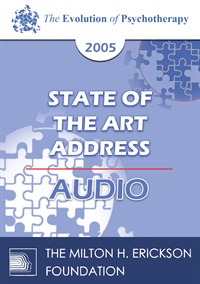
- Average Rating:
- Not yet rated
- Topic Areas:
- State of the Art Address | Psychotherapy | Therapist Development
- Categories:
- Evolution of Psychotherapy | Evolution of Psychotherapy 2005
- Faculty:
- Harville Hendrix, PhD
- Duration:
- 51 Minutes
- Format:
- Audio Only
- Original Program Date:
- Dec 11, 2005
- Short Description:
- For decades, psychotherapy based upon the paradigm of the individual, has focused on the intrapsychic world of the client. The focus is now shifting to the interpersonal, as a result of the appearance of the relational paradigm from the collective unconscious. This shifting of paradigms will challenge and transform the process of diagnosis and therapeutic interventions of all forms of therapy. This address will outline this historical shift and suggest its implications for therapy theory and practice.
- Price:
- $15.00 - Base Price
- Average Rating:
- Not yet rated
- Topic Areas:
- State of the Art Address | Neurobiology | Psychotherapy
- Categories:
- Evolution of Psychotherapy | Evolution of Psychotherapy 2005
- Faculty:
- Daniel Siegel, MD
- Course Levels:
- Master Degree or Higher in Health-Related Field
- Duration:
- 1:02:46
- Format:
- Audio and Video
- Original Program Date:
- Dec 11, 2005
- Short Description:
- Interpersonal neurobiology is a way to define mental health and the kinds of social experiences the brain requires to achieve a coherent mind. This interdisciplinary synthesis of science reveals an exciting convergence among research findings that helps us in mental health to explore the interplay among relationships, the mind and the brain. Experience shapes the connections in the brain in ways that we can now understand and harness within psychotherapy to help stimulate the neuronal activation and growth necessary to achieve resilience and emotional well-being.
- Price:
-
Sale is $29.00
price reduced from Base Price - $59.00
Tags: Neurobiology Psychotherapy
- Average Rating:
- Not yet rated
- Topic Areas:
- State of the Art Address | Rational Emotive Behavior Therapy (REBT) | Brief Therapy | Psychotherapy | Therapist Development
- Categories:
- Evolution of Psychotherapy | Evolution of Psychotherapy 2005
- Faculty:
- Albert Ellis, PhD
- Course Levels:
- Master Degree or Higher in Health-Related Field
- Duration:
- 57:01
- Format:
- Audio and Video
- Original Program Date:
- Dec 11, 2005
- Short Description:
- Dr. Ellis will describe the up-to-date principles and practice of Rational Emotive Behavior Therapy (REBT) in the twenty-first century, how some people are trying to water it down, and what its future will probably be.
- Price:
-
Sale is $29.00
price reduced from Base Price - $59.00
- Average Rating:
- Not yet rated
- Topic Areas:
- Workshops
- Categories:
- Evolution of Psychotherapy | Evolution of Psychotherapy 2005
- Faculty:
- Robert Dilts, BA
- Course Levels:
- Master Degree or Higher in Health-Related Field
- Duration:
- 1:58:09
- Format:
- Audio and Video
- Original Program Date:
- Dec 11, 2005
- Short Description:
- EP05 Workshop 33 - Imagineering: Helping Clients Find the Path to Change - Robert Dilts lmagineering is a term coined by Walt Disney to describe the process he used to form dreams and then turn them into realities. The lmagineering process essentially involves creating and evaluating the steps necessary to reach a desired state. It can be applied to help clients find creative solutions to many problems.
- Price:
-
Sale is $29.00
price reduced from Base Price - $59.00
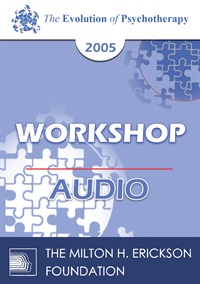
- Average Rating:
- Not yet rated
- Topic Areas:
- Workshops | Leadership | Therapist Development
- Categories:
- Evolution of Psychotherapy | Evolution of Psychotherapy 2005
- Faculty:
- William Glasser, MD
- Duration:
- 1 Hour 59 Minutes
- Format:
- Audio Only
- Original Program Date:
- Dec 11, 2005
- Short Description:
- EP05 Workshop 34 - A New Leadership Role for Mental Health Professionals - William Glasser, M.D. The leadership role in mental health has been assumed by psychiatrists who diagnose mental illnesses that do not exist and treat them with potentially harmful brain drugs. Dr. Glasser will explain that mental health separate from mental illness does exist if we could change from the mental illness model to a new public health model based on mental health. This will allow psychotherapists to assume a leadership role they don't have now.
- Price:
- $15.00 - Base Price
- Average Rating:
- Not yet rated
- Topic Areas:
- Workshops | Personality Disorders | Psychotherapy
- Categories:
- Evolution of Psychotherapy | Evolution of Psychotherapy 2005
- Faculty:
- Otto Kernberg, MD
- Course Levels:
- Master Degree or Higher in Health-Related Field
- Duration:
- 2:03:54
- Format:
- Audio and Video
- Original Program Date:
- Dec 11, 2005
- Short Description:
- EP05 Workshop 35 - Etiology, Psychotherapy. Diagnosis and Treatment Indicators for Severe Personality Disorders - Otto Kernberg, M.D. Present day knowledge and leading hypotheses regarding severe personality disorders will be reviewed, and their relationship to clinical characteristics of these patients clarified. A critical review of present classification will be followed by exploration of specific technical approaches to diagnostic interviewing and decision-making regarding specific therapeutic approaches to each patient.
- Price:
-
Sale is $29.00
price reduced from Base Price - $59.00
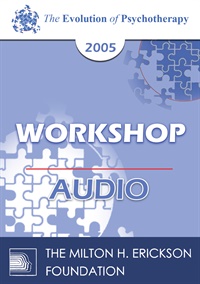
- Average Rating:
- Not yet rated
- Topic Areas:
- Workshops
- Categories:
- Evolution of Psychotherapy | Evolution of Psychotherapy 2005
- Faculty:
- Jeffrey Zeig, PhD
- Duration:
- 1 Hour 48 Minutes
- Format:
- Audio Only
- Original Program Date:
- Dec 11, 2005
- Short Description:
- EP05 Workshop 36 - Growth Games for BEING the Best Therapist - Jeffrey Zeig, Ph.D. This "playshop" will consist of experiential clinician development exercises. While it is widely agreed that the person of the therapist is central to patient change, there are limited methods for developing the person of the therapist. Dr. Zeig will present a systemic model that can be easily transferred to make therapy and supervision more powerfully experiential.
- Price:
- $15.00 - Base Price
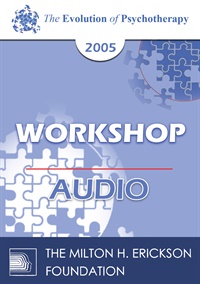
- Average Rating:
- Not yet rated
- Topic Areas:
- Workshops
- Categories:
- Evolution of Psychotherapy | Evolution of Psychotherapy 2005
- Faculty:
- Yvonne Dolan, MA
- Duration:
- 47 Minutes
- Format:
- Audio Only
- Original Program Date:
- Dec 11, 2005
- Short Description:
- EP05 Workshop 37 - A Tribute to Steve de Shazer: Originator of the Solution-Focused Brief Therapy Approach - Yvonne Dolan M.A. This workshop will celebrate the theoretical, technical and clinical contributions of the late Steve de Shazer through video tape, lecture and discussion. It will include a brief preview of material from de Shazer's most recent book, More Than Miracle: The State of the Art of Solution-Focused Brief Therapy which updates the SFBT.
- Price:
- $15.00 - Base Price
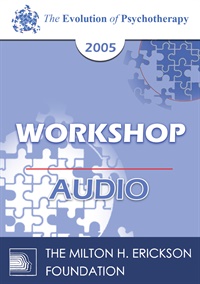
- Average Rating:
- Not yet rated
- Topic Areas:
- Workshops | Multicultural | Storytelling
- Categories:
- Evolution of Psychotherapy | Evolution of Psychotherapy 2005
- Faculty:
- Monica McGoldrick, PhD
- Duration:
- 1 Hour 34 Minutes
- Format:
- Audio Only
- Original Program Date:
- Dec 11, 2005
- Short Description:
- This workshop will explore the impact of gender, culture, class and race on our clinical practice, and describe techniques for working with clients who are culturally different from ourselves. The workshop will consider the relevance of cultural differences for families even many generations beyond immigration. The issue of stereotyping and emphasizing that everyone is ethnic will be dealt with, rather than approaching culture by focusing on the exotic, esoteric or different characteristics of minorities and new immigrant groups. Professor McGoldrick will demonstrate the use of genograms and family play to address cultural, racial and spiritual legacies and patterns in clinical assessment and intervention -- drawing them, interpreting them and applying them therapeutically.
- Price:
- $15.00 - Base Price
Tags: Multi-Cultural Storytelling
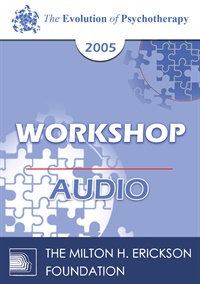
- Average Rating:
- Not yet rated
- Topic Areas:
- Workshops | Psychotherapy | Children and Adolescent Therapy | Emotional Regulation | Family Therapy | Managed Care | Positive Psychology | Systems Theory
- Categories:
- Evolution of Psychotherapy | Evolution of Psychotherapy 2005 | Pioneers in Couples and Family Therapy
- Faculty:
- Cloe Madanes, HDL, LIC | Anthony Robbins
- Duration:
- 1 Hour 58 Minutes
- Format:
- Audio Only
- Original Program Date:
- Dec 11, 2005
- Short Description:
- Robbins and Madanes address five major challenges facing modern therapy: overreliance on medication, managed care, declining therapist income, rigid protocols, and inadequate training. They introduce human needs psychology as a practical, transformative framework built on six core needs...certainty, variety, significance, connection, growth, and contribution. Emphasizing lasting change through meaning and relationships, they advocate for personal growth over quick fixes, with medication as a last resort.
- Price:
- $15.00 - Base Price
Tags: Anti-Drug Managed Care Reform Children's Rights Human Needs Emotional Control Contribution-Based Therapy Experiential Learning Positive Reframing Reframing Strategic Therapy Tailoring Utilization Mental Health Reform Human Rights Managed Care Impact Positive Psychology Anti-Pharmacology Emotional Regulation Systems Theory
- Average Rating:
- Not yet rated
- Topic Areas:
- Workshops | Dreamwork | Psychotherapy
- Categories:
- Evolution of Psychotherapy | Evolution of Psychotherapy 2005
- Faculty:
- James Hillman, PhD
- Course Levels:
- Master Degree or Higher in Health-Related Field
- Duration:
- 1:52:44
- Format:
- Audio and Video
- Original Program Date:
- Dec 11, 2005
- Short Description:
- Dreaming is a natural human function from early childhood to late maturity. Beginning with Freud and Jung the practice of clinical psychology centered originally on dream analysis. The importance of dreaming has fallen into neglect in most contemporary therapies. This workshop offers practical cues for working with dreams to benefit participants own techniques, selfknowledge and their client's psychic equilibrium.
- Price:
-
Sale is $29.00
price reduced from Base Price - $59.00
Tags: Dreams James Hillman Psychotherapy
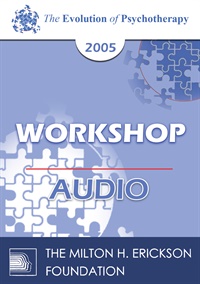
- Average Rating:
- Not yet rated
- Topic Areas:
- Topical Panels | Psychotherapy | Therapist Development | Training | Evidence-Based Practice | IMAGO | Supervision
- Categories:
- Evolution of Psychotherapy | Evolution of Psychotherapy 2005 | Pioneers in Couples and Family Therapy
- Faculty:
- Harville Hendrix, PhD | Arnold Lazarus, Ph.D. | Cloe Madanes, HDL, LIC | Scott Miller, PhD
- Duration:
- 59 Minutes
- Format:
- Audio Only
- Original Program Date:
- Dec 10, 2005
- Short Description:
- This panel explores therapist training, balancing theory with real-world practice. Hendrix emphasizes internalizing theory and using rituals; Lazarus favors evidence-based methods over excessive theory. Madanes supports training non-professionals with a systemic lens, while Miller advocates outcome-based feedback, noting traditional training doesn't always improve results. The panel agrees on the value of flexible, client-centered approaches backed by continuous evaluation. Moderated by Michael Munion, MA
- Price:
- $15.00 - Base Price
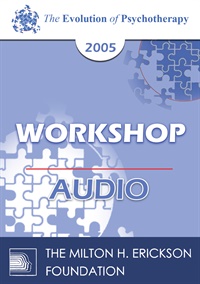
- Average Rating:
- Not yet rated
- Topic Areas:
- Topical Panels | Transference / Countertransference | Psychotherapy
- Categories:
- Evolution of Psychotherapy | Evolution of Psychotherapy 2005
- Faculty:
- James Hillman, PhD | Otto Kernberg, MD | James F. Masterson, MD | Michael White, B.A.S.W.
- Duration:
- 1 Hour
- Format:
- Audio Only
- Original Program Date:
- Dec 10, 2005
- Short Description:
- Topical Panel 15 from the Evolution of Psychotherapy 2005 - Transference / Countertransference Featuring James Hillman, PhD; Otto Kernberg, MD; James Masterson, MD; and Michael White, BASW Moderated by Ellyn Bader, PhD
- Price:
- $15.00 - Base Price
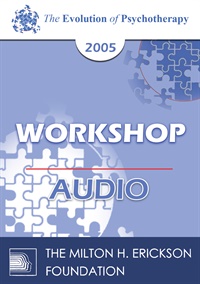
- Average Rating:
- Not yet rated
- Topic Areas:
- Topical Panels | Law & Ethics | Psychotherapy | Therapist Development
- Categories:
- Evolution of Psychotherapy | Evolution of Psychotherapy 2005
- Faculty:
- Arnold Lazarus, Ph.D. | Marsha Linehan, PhD | Thomas Szasz, MD | Jeffrey Zeig, PhD
- Duration:
- 1 Hour 3 Minutes
- Format:
- Audio Only
- Original Program Date:
- Dec 10, 2005
- Short Description:
- Topical Panel 16 from the Evolution of Psychotherapy 2005 - Ethics and Treatment Boundaries Featuring Arnold Lazarus, PhD; Marsha Linehand, PhD; Thomas Szasz, MD; and Jeffrey Zeig, PhD Moderated by Daniel Eckstein, PhD
- Price:
- $15.00 - Base Price

- Average Rating:
- Not yet rated
- Topic Areas:
- Topical Panels | Couples Therapy | Family Therapy | Psychotherapy | Cognitive Behavior Therapy (CBT) | IMAGO | Narrative Therapy | Strategic Therapy | Therapist Development | Therapist Techniques | Divorce
- Categories:
- Evolution of Psychotherapy | Evolution of Psychotherapy 2005 | Pioneers in Couples and Family Therapy
- Faculty:
- John Gottman, PhD | Julie Gottman, PhD | Harville Hendrix, PhD | Salvador Minuchin, MD | Michele Weiner-Davis, LCSW
- Duration:
- 58 Minutes
- Format:
- Audio Only
- Original Program Date:
- Dec 10, 2005
- Short Description:
- This panel on family therapy brings together leading voices to reflect on the field’s evolution and future. Speakers emphasize emotional connection, mutual respect, and the relational paradigm as central to lasting relationships. Topics include managing perpetual conflict with gentleness, nurturing small daily connections, and embracing difference. The conversation highlights solution-focused strategies and encourages an optimistic, flexible stance in clinical work.
- Price:
- $15.00 - Base Price

- Average Rating:
- Not yet rated
- Topic Areas:
- Topical Panels | Addiction | Psychotherapy | Ethical Practice | Supervision
- Categories:
- Evolution of Psychotherapy | Evolution of Psychotherapy 2005 | Pioneers in Couples and Family Therapy
- Faculty:
- Claudia Black, PhD | Robert Dilts, BA | James Hillman, PhD | Scott Miller, PhD
- Duration:
- 58 Minutes
- Format:
- Audio Only
- Original Program Date:
- Dec 10, 2005
- Short Description:
- Addiction experts examine the complex nature of addiction, discussing innovative treatment approaches including NLP, therapeutic alliance, and family interventions. The discussion covers multi-level treatment strategies, the impact of trauma, co-occurring disorders, and the critical role of personalized care in helping individuals overcome substance and behavioral addictions. Moderated by Betty Alice Erickson.
- Price:
- $15.00 - Base Price
- Average Rating:
- Not yet rated
- Topic Areas:
- Workshops | Positive Psychology | Psychology | Depression | Happiness | Psychotherapy
- Categories:
- Evolution of Psychotherapy | Evolution of Psychotherapy 2005
- Faculty:
- Martin Seligman, PhD
- Course Levels:
- Master Degree or Higher in Health-Related Field
- Duration:
- 2:44:51
- Format:
- Audio and Video
- Original Program Date:
- Dec 10, 2005
- Short Description:
- Happiness can be usefully dissolved into the Pleasant Life (Positive Emotions), the Engaged Life, and the Meaningful Life. The mission of Positive Psychology is to understand and build these three lives. Dr. Seligman will describe interventions that raise happiness, so defined, and will detail their effects on depression.
- Price:
-
Sale is $29.00
price reduced from Base Price - $59.00
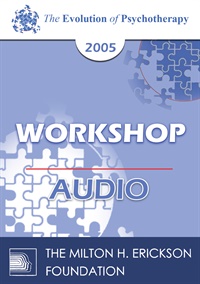
- Average Rating:
- Not yet rated
- Topic Areas:
- Workshops | Trauma | Eye Movement Desensitization and Reprocessing (EMDR) | Hypnosis | Memory | Neurobiology | Neuroscience | Psychotherapy
- Categories:
- Evolution of Psychotherapy | Evolution of Psychotherapy 2005
- Faculty:
- Bessel van der Kolk, MD
- Duration:
- 2 Hours 7 Minutes
- Format:
- Audio Only
- Original Program Date:
- Dec 10, 2005
- Short Description:
- Starting with a review of recent studies on the neurobiology of trauma, Dr. van der Kolk will examine the utility of approaches from the fields of hypnosis, body oriented therapies and EMDR, both with research data and videotaped clinical interventions. The integration of these approaches during different stages of treatment will be discussed.
- Price:
- $15.00 - Base Price
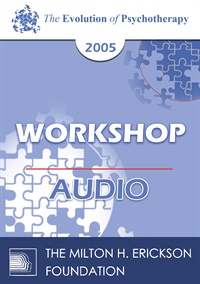
- Average Rating:
- Not yet rated
- Topic Areas:
- Workshops | Psychotherapy | Therapist Development
- Categories:
- Evolution of Psychotherapy | Evolution of Psychotherapy 2005
- Faculty:
- Robert Dilts, BA
- Duration:
- 2 Hours 36 Minutes
- Format:
- Audio Only
- Original Program Date:
- Dec 10, 2005
- Short Description:
- Identity has to do with such questions as "Who am I?"; "What are my limits?"; "What is my purpose?" Clarifying the deep structure of our identity allows us to express ourselves even more fully at the level of our behavioral surface structure. It involves: Finding and clarifying our life's direction; managing boundaries between self and others; becoming clear about beliefs that support our identity and those which limit us; expanding our sense of self, and incorporating new dimensions of being.
- Price:
- $15.00 - Base Price
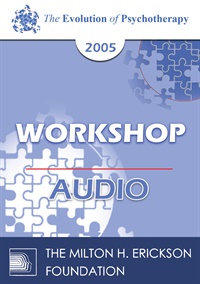
- Average Rating:
- Not yet rated
- Topic Areas:
- Workshops | Psychotherapy
- Categories:
- Evolution of Psychotherapy | Evolution of Psychotherapy 2005
- Faculty:
- Nicholas Cummings, PhD
- Duration:
- 2 Hours 36 Minutes
- Format:
- Audio Only
- Original Program Date:
- Dec 10, 2005
- Short Description:
- EP05 Workshop 31 - Behavioral Health as Primary Care: Psychotherapy's Future as a Primary Care Profession - Nicholas Cummings, Ph.D. Co-faculty: William O'Donohue, Ph.D. Several large health systems are now co-locating behavioral care providers (BCPs, Primarily psychologists and social workers) in the primary care setting, side-by-side with primary care physicians (PCPs). Research has already shown when a PCP can walk the patient down the hall to the BCP's office, 90% of patients engage in treatment as opposed to only 10% of referrals today. This presages opportunities for psychotherapists who wish to participate, and this workshop will address how to anticipate, prepare and avoid the pitfalls of a new integrated behavioral/primary care delivery system.
- Price:
- $15.00 - Base Price
- Average Rating:
- Not yet rated
- Topic Areas:
- State of the Art Address | Psychotherapy | History of Psychotherapy
- Categories:
- Evolution of Psychotherapy | Evolution of Psychotherapy 2005
- Faculty:
- Nicholas Cummings, PhD
- Course Levels:
- Master Degree or Higher in Health-Related Field
- Duration:
- 1:01:58
- Format:
- Audio and Video
- Original Program Date:
- Dec 10, 2005
- Short Description:
- Psychotherapy practice, as we know it today, was born in World War II. Dr. Cummings was there, working with paratroopers in combat, and he has been a psychotherapist and mental health activist in the 60 years since. He wrote the first prepaid psychotherapy insurance benefit in the late 1950s and demonstrated that psychotherapy should be part of all health insurance. He has been in the forefront as an active participant in psychotherapy's achievements, setbacks and hopes for the future. This address will highlight the 60 years of psychotherapy's evolution through the life of one of its leaders.
- Price:
-
Sale is $29.00
price reduced from Base Price - $59.00
- Average Rating:
- Not yet rated
- Topic Areas:
- State of the Art Address | Psychotherapy | Positive Psychology | Depression | Happiness | Psychology
- Categories:
- Evolution of Psychotherapy | Evolution of Psychotherapy 2005
- Faculty:
- Martin Seligman, PhD
- Course Levels:
- Master Degree or Higher in Health-Related Field
- Duration:
- 56:23
- Format:
- Audio and Video
- Original Program Date:
- Dec 10, 2005
- Short Description:
- Happiness consists of The Pleasant Life (Positive Emotions), the Engaged Life, and the Meaningful Life. Interventions which build these three lives fight depression. Dr. Seligman will present empirical documentation of this for individual, group, and web-based interventions.
- Price:
-
Sale is $29.00
price reduced from Base Price - $59.00








